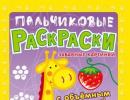Declining compound nouns with a hyphen. Determination of the kind of compound words. It is important to know about the declension of words
When declining compound nouns with the first component floor ...(floor- ) in the meaning "half" and the second part, which is a noun in genitive, component floor...(floor-) in indirect cases (except for the accusative) takes the form semi ..., and the second part changes in accordance with the declension of the given noun: "More passed six months"(Turg.);" B half a verst from the station he sat down on a stone by the road and began to look at the sun "(Ch.).
Indirect case forms with an unchangeable part floor... typical for colloquial speech. In literary contexts, such a use is inappropriate. Therefore, they are unjustified in newspaper examples such as: "From half liter[followed half liter] extract turns out 5 liters of bread kvass "," There are rather large lobsters - up to half a meter[followed before half a meter] and weighing up to eleven kilograms. "
Compound words like raincoat tent, beam crane, captain-director with closely merged parts, they are inclined only in the second part: take cover with a raincoat, near the girder, conversation with the captain-director of the flotilla, in the "Roman Gazeta" printed.
With less cohesion component parts parallel case forms are possible: in colloquial speech only the second part is inclined, in the book - both parts; Wed: in a dining car - in a restaurant car, at a tournament match - at a tournament match, in the midst of a masquerade ball - in the midst of a masquerade ball. Wed also: from the lieutenant commander - from the engineer-economist(in the first case, a fused term, in the second - a combination of the word being defined and the application with it).
16. WORD FORMATION OF NONS. SUBSTANTIATION
Nouns are formed in modern Russian different ways... So, a significant number of new nouns appeared as a result of rethinking the meaning of words existing in the language and their complete separation from each other, i.e. as a result of the appearance of homonyms ( lexico-semantic word formation). For example: foreman, pioneer, plant, world and etc.
It is also possible to form words from phrases ( lexical-syntactic way). For example: pastime, bloodshed and etc.
Sufficiently productive is morphological-syntactic way, especially substantiation of adjectives which can act as both nouns and adjectives, for example: military, henchman, worker, private, civilian, family, passer-by, equestrian, foot, native, junior, senior, boiler room, dining room, operating room etc.
but the most productive, richest way is morphological word formation... Moreover, of all types of morphological word formation of nouns especially common suffix, suffix-prefix modes (affixation) and addition of stems ... However, the degree of their productivity is different.
So, the prefixed (prefixal) way in the word formation of nouns plays a lesser role in comparison with the suffixal way. Most often, nouns with prefixes in their origin are associated with verb stems or the stems of adjectives with the same prefixes.
Suffix way
Among derivational suffixes, there are unproductive ones, with the help of which new words are not currently formed (for example, the suffix -н: sick-zn, zh-zh; the suffix -uh: pet-uh, past-uh) is unproductive, and suffixes productive, actively participating in modern word formation.
All productive derivational suffixes are divided into several groups:
1) suffixes that serve to form the names of objects (Among the suffixes of this group, a number of productive suffixes stand out, for example:
1) -lnik, -lk-a, with the help of which nouns are formed (most often from verb stems) with the meaning of the instrument of action, the name of the device (alarm clock, refrigerator, winnowing fan, heating pad, thresher);
2) -shchik (-chik), with the help of which nouns are formed (both from verbal and noun stems) with the same meaning (counter, signalman); words with these suffixes are used in different styles speech, but most typical for scientific and technical speech;
3) -ln-i, with the help of which feminine nouns are formed with the meaning of the place of action (reading room, dyehouse, bathing house, etc.);
4) -th (s) used for the formation (most often from nominal stems with prefixes of spatial meaning) nouns with the meaning of place (district, foothill, forearm, open field, foot, etc.);
5) -k-a used to form nouns (most often from the stems of relative adjectives in -ov-, -ev-), which are the name of objects according to their characteristic (anisovka, inch, pantry, tin); words with this suffix are used mainly in colloquial speech; the same suffix is also used in the formation of words used as a colloquial (or even colloquial) synonym for combining an adjective with a noun: Tretyakov Gallery (Tretyakov Gallery), Vecherka (evening newspaper), etc .;
6) -Nick, with the help of which (most often from nominal bases) nouns are formed to denote a container, a device for something, for something (a coffee pot, a wallet, a pigsty, etc.);
7) -in-a used to form nouns with the meaning of singularity (bead, straw, pearl, etc.), as well as (from verb stems with prefixes) nouns with the meaning of the result of an action (pothole, dent, debris, tan, etc.);
8) -tor, used to form masculine nouns denoting tools of action, devices, mechanisms (insulator, separator, retainer, etc.); such words are used mainly in industrial and technical speech;
9) -l-o, which is used to form neuter nouns from verbal stems (with and without prefixes) with the meaning of an instrument of action (blanket, blower, sinker, etc.); words of this type are used mainly in industrial and technical speech.);
2) suffixes used to form the names of persons (men and women);
1) -chik, -chik, with the help of which nouns are formed both from the stems of the verb and from the stems of nouns with and without prefixes (subscriber, peddler, bathhouse attendant, typesetter, newspaperman, loader, beater, etc.);
2) -lshik, with the help of which nouns are formed from verb stems (driller, planer); words with these suffixes are used mainly in industrial and technical speech;
3) -tel, -tel used to form nouns from verbal stems with and without prefixes (accuser, educator, educator, seeker, destroyer, etc.); words with these suffixes are used mainly in book speech;
4) -ik, -nik, with the help of which nouns are formed both from the bases of nouns and from the bases of adjectives with the meaning of persons in their relation to the subject, to the profession, as well as with the meaning of the attitude of a person to an action, an act (virgin land, academician, chemist, personnel officer, food worker, atheist, envious, key keeper, etc.);
5) -sheep, -ets, -st, with the help of which nouns are formed (from the stems of nouns) to name persons in relation to their institution, profession, activity, ideological direction (university student, Iskraist, Michurinist, signalman, journalist, etc.); words with these suffixes are used mainly in book styles of speech;
6) -ach, used in the formation of nouns from nominal stems to designate persons in relation to the profession, the type of activity, as well as according to their characteristic feature (circus, bearded, strongman, etc.); many words with these suffixes are used most often in colloquial speech;
7) -ant (-yant), -ent, with the help of which nouns are formed from nominal and verbal stems to designate persons in relation to their occupation, to activity (cadet, musician, assistant, emigrant, etc.); such words are mainly used in book styles of speech;
8) -tor, with the help of which nouns are formed (from both verb and noun stems) to designate persons associated with certain actions (liquidator, operator, agitator, disinfector, etc.); similar words are used in different styles of speech, but are most typical for book speech;
9) -anin (-janin), -in, -anin (-yanin), -canin, with the help of which nouns are formed to denote persons in relation to a country, nation, to a personal name with which a certain ideological direction is associated (American, Spaniard, Kievite, Gorky, Tatar, Bulgarian, Hegelian, Voltairian);
More than 1000 compound words such as engineer-major, plan-order, boarding school, ton-kilometer are registered in spelling dictionaries. The number of such names is constantly growing along with the growth of the names of new professions, the creation of new institutions, machines, inventions.
By the nature of the declination of the components, the following categories of compound names are distinguished.
One of the components of compound names remains unchanged in declension in the following cases.
1.1. One of the components is not inflected if it is an unchangeable word, a recent borrowing, a letter name, or an abbreviation. The overwhelming majority of such names are formations, the unchangeable element of which is the first word. For example: cocoa beans, diner cafe, conference room, price list, x-rays, amusement park.
In professional use, a kind of immutable morpheme words have appeared, around which a series of compound names are grouped. The main ones are: alpha- (-activity, waves), block- (-map, -signal, -form), vacuum- (-apparatus, -camera, -process), diesel- (-generator, -motor), press - (-tool, -nakat).
1.2. Much fewer compound names with a non-declining second word; in such cases, only the first component of addition declines: the maximum program, the fixed idea, the comedy buff.
There is a tendency to the immutability of the first part of compound words in those series of names where the first word approaches the corresponding adjective in meaning: National Socialists, headquarters officer, headquarters, wagon-goods. This also includes: Internet cafes, offset machine, quartz sand, zero point.
The most variegated group is made up of names in which the first word is not associated with either borrowings or truncated adjectives. In this category, the tendency towards immutability is primarily due to semantic reasons - the semantic cohesion of the components and the frequency of the use of the name in everyday speech.
The most free combination of words in the composition of double names is observed in numerous names of persons by profession, position, title. These are the names with the words: engineer- (-metallurgist, -radist, -electrician, -builder), author- (-illustrator, -seeker), minister-president, member-shareholder, etc. Both words are inclined in these names.
Exception from general rule constitutes a closed group of composite designations of military and government ranks and ranks in which the qualifying first part does not incline: admiral general, lieutenant commander, lord chancellor, prime minister, chamber junker.
From professional use into literary practice, the indefatigability of the first element of all complex units of measurement has penetrated: kilowatt-hour, volt-ampere, coulomb meter, etc.
In the large group of double names for various phenomena of external life, the names of institutions, household items, inventions, machines, etc., both components are usually inclined. These are words such as: express bus, van car, buffet car, sofa bed, reading room, rocking chair, masquerade ball.
However, among the most commonly used names such as plan-map, novel-newspaper, with a strict literary norm requiring the declension of both components, non-declining variants at the junction of words have spread in colloquial speech: excerpts from a novel-newspaper, filling out a plan-map.
V last years a number of compound names with a non-declining first word have been significantly replenished: design project, master class, CD, etc.
(c) Dmitry Zerkalov
The site in 65 languages of the world presents the most powerful weapon of our time - information. We are working to let you know more. Our mission - strengthening cultural, spiritual and economic ties between peoples on the basis of a common understanding by social elites of the problems of peace, human rights, sustainable development society and joint safe life.
We do not collect the latest news, there are special sites for this. We archive materials, the relevance of which has not passed over the years.
Dmitry ZERKALOV
zerkalovvoliacable.com
mob. 066 139 7742
To avoid automatic reading of addresses Email as spammers, we give our addresses in text format, where = @. When using materials from the site, the author will be very THANK YOU for the LINK to www.site // ATTENTION! We kindly ask you to report any typos, errors, broken or incorrect links to the address: zerkalovvoliacable.com// THE OPINION of the authors of the materials published on the site MAY NOT COINCIDE with the position of the author of the site //
online now
online now 0 users and 486 guests.
How to inflect compound nouns?
More than 1000 compound words of the type are registered in the spelling dictionaries major engineer, plan-order, boarding school, ton-kilometer... The number of such names is constantly growing along with the growth of the names of new professions, the creation of new institutions, machines, inventions.
By the nature of the inclination of the components the following categories of compound names are distinguished.
One of the components of compound names remains unchanged in declension in the following cases.
1.1. One of the components is not inflected if it is an immutable word, a recent borrowing, a letter name, or an abbreviation. The overwhelming majority of such names are formations, the unchangeable element of which is the first word. For example: cocoa beans, snack bar, conference room, price list, x-rays, amusement park.
In professional use, a kind of immutable morpheme words have appeared, around which a series of compound names are grouped. The main ones are: alpha- (-activity, waves), block- (-map, -signal, -form), vacuum- (-apparatus, -camera, -process), diesel- (-generator, -motor), press- (-tool , -nakat).
1.2. Much fewer compound names with a non-declining second word; in such cases, only the first component of the addition is declined: maximum program, comedy buff.
There is a tendency towards the immutability of the first part of compound words in those series of names where the first word approaches in meaning to the corresponding adjective: National Socialists, headquarters officer, headquarters, wagon train. This also includes: internet cafe, offset machine, quartz sand, zero point.
The most variegated group is made up of names in which the first word is not associated with either borrowings or truncated adjectives. In this category, the tendency towards immutability is primarily due to semantic reasons - the semantic cohesion of the components and the frequency of the use of the name in everyday speech.
The most free combination of words in the composition of double names is observed in numerous names of persons by profession, position, title. These are the names with the words: engineer- (-metallurgist, -radist, -electrician, -builder), author- (-illustrator, -seeker), minister-president, member-shareholder and so on. Both words are inclined in these names.
An exception to the general rule is a closed group of composite designations of military and state ranks and ranks, in which the qualifying first part does not incline: Admiral General, Lieutenant Commander, Lord Chancellor, Prime Minister, Chamber Junker.
From professional use into literary practice, the unwillingness of the first element of all complex units of measurement has penetrated: kilowatt-hour, volt-ampere, coulomb-meter etc.
In the large group of double names for various phenomena of external life, the names of institutions, household items, inventions, machines, etc., both components are usually inclined. These are words like: express bus, van, buffet car, sofa bed, reading room, rocking chair, masquerade ball.
However, the most commonly used names like plan-map, novel-newspaper with a strict literary norm requiring the declension of both components, non-declining variants at the junction of words have spread in colloquial speech: excerpts from the novel-newspaper, filling in the plan-map.
In recent years, a number of compound names with a non-declining first word have been significantly replenished: design project, master class, CD and etc.
A question from the Information Bureau. How to inflect a noun invoice. What kind of word is this?
Invoice- masculine noun. Right: invoice issued, invoice received etc. When declining, both parts of this word change:
| invoice | invoices |
| invoices | invoices |
| invoice | invoices |
| invoice | invoices |
| invoice | invoices |
| about invoice | about invoices |
On this page, you can view the declension of the word "double" by cases both in the singular and in the plural. Double word consisting of 7 letters. Declension table "double" by case is given below. Through the search, you can find other words you need.
Plural
Singular
It is important to know about the declension of words
Difficulties in the formation of forms of numbers and their use in speech are mainly associated with their change in cases and combination with nouns.
Most of the numerals are declined in the third declension.
The numeral thousand changes as a noun of the first declension.
The numerals forty and one hundred have only one form in indirect cases - forty, one hundred ..
When declining compound ordinal numbers, only their last part changes. Collective numbers (two, three, etc.) can only be used with masculine nouns, nouns denoting baby animals, or nouns that have only a form plural.
Combinations of compound numerals ending in two, three, four, with nouns that do not have a singular form are not allowed. Only combinations such as twenty-one days, twenty-five days are possible.
The pronoun-numeral both have two generic forms: both are masculine and neuter, both are feminine. The same applies to the number one and a half.
Adjectives are a part of speech that denotes a feature of an object and answers the questions what?, What?, What?, What? The adjective is in the same case form, number and gender as the noun on which it depends.
V singular adjectives vary in gender and case. The gender of plural adjectives is not defined.
In plural adjectives, the gender cannot be determined.
Changing nouns by case is characterized by a change in their endings, which are called case forms. In total, there are six cases in Russian, each of which has its own auxiliary question.
The nominative form is called direct (or initial), all others - indirect.
Cases express the different roles of a noun in a sentence. There are six cases in Russian. You can determine the case of a noun in a sentence by question.
In addition to the main questions, the case of a noun can also be learned from the auxiliary questions, which are answered by the circumstances.
Video tutorial on the Russian language "Changing nouns by case"
How to inflect compound nouns?
More than 1000 compound words of the type are registered in the spelling dictionaries major engineer, plan-order, boarding school, ton-kilometer... The number of such names is constantly growing along with the growth of the names of new professions, the creation of new institutions, machines, inventions.
By the nature of the inclination of the components the following categories of compound names are distinguished.
One of the components of compound names remains unchanged in declension in the following cases.
1.1. One of the components is not inflected if it is an immutable word, a recent borrowing, a letter name, or an abbreviation. The overwhelming majority of such names are formations, the unchangeable element of which is the first word. For example: cocoa beans, snack bar, conference room, price list, x-rays, amusement park.
In professional use, a kind of immutable morpheme words have appeared, around which a series of compound names are grouped. The main ones are: alpha- (-activity, waves), block- (-map, -signal, -form), vacuum- (-apparatus, -camera, -process), diesel- (-generator, -motor), press- (-tool , -nakat).
1.2. Much fewer compound names with a non-declining second word; in such cases, only the first component of the addition is declined: maximum program, comedy buff.
There is a tendency towards the immutability of the first part of compound words in those series of names where the first word approaches in meaning to the corresponding adjective: National Socialists, headquarters officer, headquarters, wagon train. This also includes: internet cafe, offset machine, quartz sand, zero point.
The most variegated group is made up of names in which the first word is not associated with either borrowings or truncated adjectives. In this category, the tendency towards immutability is primarily due to semantic reasons - the semantic cohesion of the components and the frequency of the use of the name in everyday speech.
The most free combination of words in the composition of double names is observed in numerous names of persons by profession, position, title. These are the names with the words: engineer- (-metallurgist, -radist, -electrician, -builder), author- (-illustrator, -seeker), minister-president, member-shareholder and so on. Both words are inclined in these names.
An exception to the general rule is a closed group of composite designations of military and state ranks and ranks, in which the qualifying first part does not incline: Admiral General, Lieutenant Commander, Lord Chancellor, Prime Minister, Chamber Junker.
From professional use into literary practice, the unwillingness of the first element of all complex units of measurement has penetrated: kilowatt-hour, volt-ampere, coulomb-meter etc.
In the large group of double names for various phenomena of external life, the names of institutions, household items, inventions, machines, etc., both components are usually inclined. These are words like: express bus, van, buffet car, sofa bed, reading room, rocking chair, masquerade ball.
However, the most commonly used names like plan-map, novel-newspaper with a strict literary norm requiring the declension of both components, non-declining variants at the junction of words have spread in colloquial speech: excerpts from the novel-newspaper, filling in the plan-map.
In recent years, a number of compound names with a non-declining first word have been significantly replenished: design project, master class, CD and etc.
A question from the Information Bureau. How to inflect a noun invoice. What kind of word is this?
Invoice- masculine noun. Right: invoice issued, invoice received etc. When declining, both parts of this word change:
| invoice | invoices |
| invoices | invoices |
| invoice | invoices |
| invoice | invoices |
| invoice | invoices |
| about invoice | about invoices |






